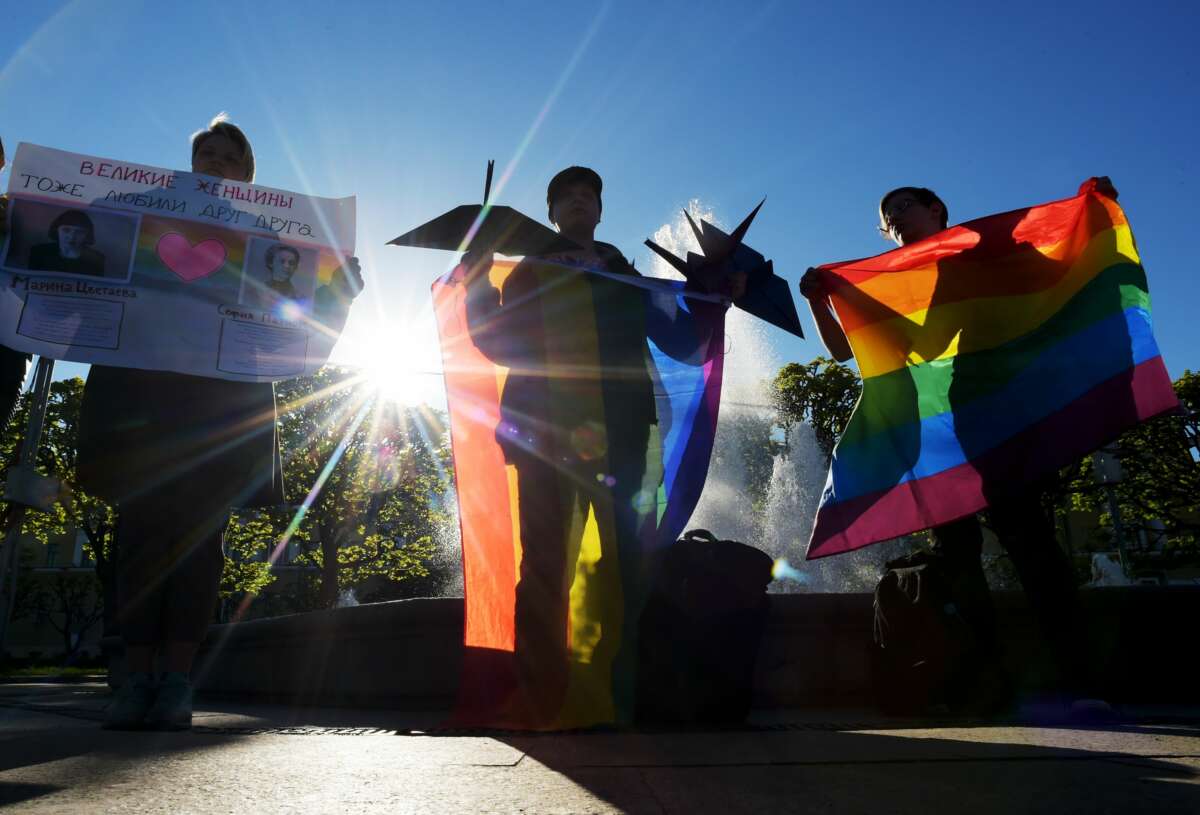Support justice-driven, accurate and transparent news — make a quick donation to Truthout today!
Russian authorities have initiated the country’s first-ever criminal case into “LGBT extremism,” according to Yekaterina Mizulina, head of the Kremlin-aligned Safe Internet League.
Mizulina asserted that criminal charges were filed “in connection with the activities of the LGBT club Pose.” Russian media reported that visitors of the club informed law enforcement that the establishment was purportedly endorsing the “LGBT extremist movement.”
In December, the Russian Supreme Court jeopardized the safety and welfare of LGBTQ people in the country by deeming what it terms the “international LGBT public movement” as “extremist.” The ruling did not specify the nature of this movement, but Russian officials have historically employed this phrase to dismantle LGBTQ organizations, target LGBTQ individuals, and suppress LGBTQ communities, according to the Human Rights Campaign (HRC).
“There is no justice in this decision, there is no justice in governing based on fear, and there is no justice in a country that is intent on criminalizing people on the basis of who they are or who they love,” Jean Freedberg, HRC’s Director of Global Partnerships, said in a statement.
As reported by The New York Times, the Russian Ministry of Justice brought the case to the Supreme Court on November 17. The ruling was handed down in a hidden four-hour session in which opposing arguments were reportedly not permitted.
“This is a deeply cynical move aimed at dehumanizing and persecuting the entire LGBTI community. Sadly, in Russia’s prevailing climate of rampant state-promoted homophobia, it does not come as a surprise,” Marie Struthers, Amnesty International’s Director for Eastern Europe and Central Asia, said in November.
This ruling represents the most recent action in Russia’s ongoing campaign to suppress the LGBTQ rights movement. In 2013, the introduction of Russia’s “gay propaganda” law criminalized the dissemination of any “propaganda of nontraditional sexual relations.” This law was later broadened in 2022 to further target LGBTQ people by encompassing a wider array of offenses.
“The assault on LGBT rights has become a symbol of Russia’s rejection of universal human rights, as the government positions Russia as the defender of so-called traditional values in opposition to ‘the collective West,’” said Tanya Lokshina, associate Europe and Central Asia director at Human Rights Watch. “Russian LGBT people need support now more than ever.”
Additionally, in 2023, the Russian parliament passed far-reaching anti-transgender legislation, which prohibited gender-affirming care and the changing of gender markers on legal documents. It also included provisions to invalidate marriages involving individuals who have “changed gender” and bar transgender people from fostering or adopting children.
Defining the LGBTQ movement as “extremist” opens any LGBTQ individual in Russia to the whims of arbitrary actions by authorities and criminalizes any action taken to advocate for LGBTQ rights. Under Russian law, involvement in or funding of an extremist organization carries a penalty of up to 10 years’ imprisonment. Those under investigation or facing prosecution for involvement in “extremist” activities often have their bank accounts frozen, encounter employment restrictions, and may be banned from participating in elections.
Additionally, categorizing a movement as “extremist” results in the banning of the organization’s symbols, which in this case includes the LGBTQ pride flag. Anyone caught displaying these symbols risks being administratively detained for up to 15 days and imprisoned for up to four years under Article 20.3 of the Administrative Offenses Code.
People in Russia have already been criminalized for wearing and posting pride flags on social media. In late January, a woman in Nizhny Novgorod was detained for five days for wearing rainbow-colored earrings and, separately, a judge in the Volgograd region imposed a fine for the display of a rainbow flag on a social media platform. Additionally, in early February, a woman in Saratov was fined for sharing a rainbow flag on social media.
“Life in silence and in fear of humiliation and imprisonment — this is the price that the state wants to impose on countless LGBTI people in Russia. This disgraceful move by the Ministry of Justice must be withdrawn immediately,” Struthers said. “Moreover, all homophobic laws passed in the last decade must be repealed, and those affected by them must receive fair compensation.”
At least three organizations advocating for LGBT rights have ceased their activities due to concerns about potential prosecution. The ruling has also led to a spate of police raids on gay clubs.
“For years, Russian authorities tried to erase LGBT visibility, and now they have criminalized it,” Lokshina said.
Press freedom is under attack
As Trump cracks down on political speech, independent media is increasingly necessary.
Truthout produces reporting you won’t see in the mainstream: journalism from the frontlines of global conflict, interviews with grassroots movement leaders, high-quality legal analysis and more.
Our work is possible thanks to reader support. Help Truthout catalyze change and social justice — make a tax-deductible monthly or one-time donation today.
